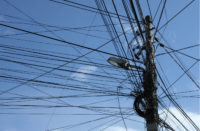Democratic systems are at risk from a reliance on oligarchs’ money flows, says Tom Burgis, an author and journalist at the Financial Times.
Burgis is the author of a 2020 book called Kleptopia: how dirty money is conquering the world.
In an interview with Ed Butler of the BBC World Service this morning, Burgis warned that the recent outbreak of war in Ukraine should be seen as part of a broader trend, under which powerful ruling elites manipulate public opinion and seek geopolitical change for their own ends.
“What the global economy is yielding is interconnected ruling classes”
“The kleptocrats of the world are uniting,” Burgis said.
“In the Ukraine they use tanks and missiles. In Zimbabwe and Kazakhstan they use torture and in the West they use money.”
“What the global economy is yielding is interconnected ruling classes, who are increasingly disconnected from the ordinary people in whose name they are supposed to be able to rule,” said Burgis.
Following Russia’s invasion of Ukraine, governments in Western countries have announced a raft of sanctions against those close to Russian president Putin’s regime.
Yesterday, the UK government announced it would bring forward long-stalled legislation to crack down on dark money flows and corrupt elites.
The UK said it would introduce a new register requiring anonymous foreign owners of UK property to reveal their true identities. This step, it said, would ensure criminals cannot hide behind secretive chains of shell companies.
Entities who do not declare their beneficial owner will face restrictions over selling their property, and those who break the rules could face up to 5 years in prison, the UK government said.
“By legislating now, we will send a clear warning to those who have or who are thinking about using the UK property market to launder ill-gotten gains, particularly those linked to the Putin regime,” the UK’s business secretary, Kwasi Kwarteng, said in parliament earlier this week.
However, according to Burgis, the new measures will mean nothing in the absence of adequate enforcement capabilities.
In his BBC interview, he gave examples of the UK government’s lack of control over existing anti-money-laundering measures, which he said were good enough in theory.
“The UK already has a really good regime against money laundering and on combating dirty money. It has all sorts of defences on paper. The problem is that they’re not enforced,” Burgis said.
“4000 of those declared at Companies House are supposedly under the age of two. One of them hasn’t been born yet.”
“It’s already a rule that all companies registered in the UK have to declare their true human owners—persons of significant control. But 4000 of those [persons of significant control] declared at Companies House are supposedly under the age of two. One of them hasn’t been born yet,” Burgis said.
He went on to pinpoint the delegation of anti-crime measures as a significant problem.
“It’s true that there are all sorts of intermediaries, estate agents, bankers, lawyers, and so on, who are supposedly obliged to know the human identity of the person they’re dealing with, and they sell a house or a piece of art or whatever it may be,” Burgis said.
“Dirty money is like a virus. One you release it, it mutates, it infects everything it touches, and you can’t control it. It doesn’t behave like normal money. It wants to overpay for houses. The huge problem here is that we’ve outsourced the policing of our dirty money regime to the people in the field, the people who have an incentive to take the money, and we have massively under-resourced the state agencies that should police it.”
According to Burgis, kleptocratic money flows have already deeply compromised the governance of the UK.
“There’s no number we can put on the extent to which British politics has been compromised by dirty money,” he said.
“Ruling elites see their role as preserving their own power, influence and wealth and those of their allies at the expense of the rest”
“We can certainly tot up very large numbers of money that has flowed in from people who’ve got rich in kleptocracies and who have used that wealth to buy access and influence in our political parties. And some of them have been elevated to our parliament in the House of Lords.”
“There is nothing in the soil of the UK that keeps it a democracy, just as there’s nothing in the in the soil of Nigeria or Russia that makes them kleptocracies. These are just norms: the extent to which power is wielded for the many as opposed to the few.”
“As money from kleptocracies builds up in the UK, yes, in politics, but also in our cultural sector and our media, we perhaps risk starting to become more like those kleptocracies in that ruling elites see their role as preserving their own power, influence and wealth and those of their allies at the expense of the rest. That’s what’s at stake,” said Burgis
Later today Burgis will appear at the High Court in London to defend a libel case.
A London company owned by oligarchs from the former Soviet Union is suing Burgis and his publisher, Harper Collins UK, over allegations made in Kleptopia.
Yesterday a member of parliament from the UK’s ruling conservative party, Bob Seely, used parliamentary privilege to name a number of London law firms he said had been acting on behalf of Russian oligarchs to seek to muzzle the UK press.
Sign up here for the New Money Review newsletter
Click here for a full list of episodes of the New Money Review podcast: the future of money in 30 minutes
Related content from New Money Review









